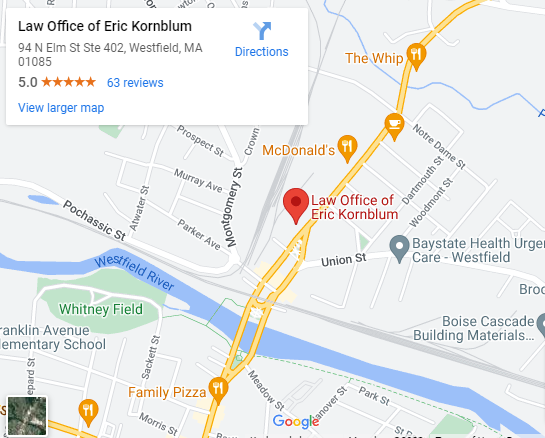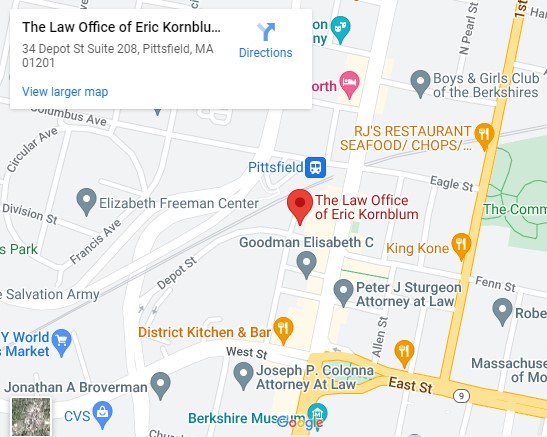Know Your Legal Options in Divorce and Bankruptcy Filing
Facing both divorce and bankruptcy can feel like a daunting and overwhelming experience for anyone. The stress and uncertainty of navigating the legal and financial aspects of these life-changing events can take a toll on one’s mental and emotional well-being. Couples facing these challenges of divorce and filing for bankruptcy in Springfield are not alone. However, with the right support and guidance, it is possible to navigate the process and come out on the other side with a renewed sense of hope and stability.
When life takes a turn for the worst, and divorce and bankruptcy seem like the only options, it’s time to turn to a Massachusetts bankruptcy attorney, like the Law Office of Eric Kornblum, and get back on the path to financial stability and emotional healing. Schedule a conversation with us today!
Why do I need a Bankruptcy Lawyer in Springfield, MA?
The process of divorce and bankruptcy can be a difficult and emotional time for anyone, and having the right legal representation can make all the difference. A good bankruptcy lawyer can provide top-notch legal support for individuals facing these challenges. It must be committed to representing clients and a thorough understanding of the legal complexities involved. A lawyer must be dedicated to helping clients achieve the best possible outcome.
Qualities of a Bankruptcy lawyer:
- Representation: A Bankruptcy attorney must treat clients with understanding during this difficult time.
- Extensive Legal Knowledge: A bankruptcy attorney must have a deep understanding of the complexities, like family law and bankruptcy law, involved in divorce and bankruptcy cases and stay up-to-date on law changes.
- Attention to Detail: A bankruptcy lawyer must have a meticulous approach to each case, leaving no stone unturned to secure the best possible outcome for their clients.
- Strong Communication Skills: A bankruptcy lawyer must have clear and effective communication, keeping clients informed throughout the process.
- Results-Driven: A bankruptcy lawyer must be focused on achieving the best possible outcome for their clients and will work tirelessly to ensure that their rights are protected.
For individuals facing divorce and filing for bankruptcy in Springfield, MA, the Law Office of Eric Kornblum offers the experienced representation and support they need to navigate this difficult time. For bankruptcy concerns, schedule a conversation now!
Why do Divorce & Bankruptcy overlap?
Divorce and bankruptcy are two life events that can significantly impact an individual’s financial and emotional well-being. Unfortunately, these two events often overlap, and the reasons for this overlap are rooted in the financial and emotional strain that divorce can cause.
Divorce and bankruptcy often overlap for several reasons, including the following:
- Financial strain: Divorces often result in the division of assets and liabilities, which can create a financial strain for both parties. This can lead to difficulty in paying bills and maintaining a comfortable standard of living.
- Loss of income: The loss of a spouse’s income can make it difficult to maintain the same standard of living, leading to an increase in debt and financial strain.
- Legal fees: The legal fees associated with divorce proceedings can add to financial stress, especially if the divorce is contested or involves complex financial issues.
- Impulsive financial decisions: The emotional stress and uncertainty caused by a divorce can lead individuals to make impulsive financial decisions that can further exacerbate their financial difficulties.
- Increased debt: The division of assets and liabilities, loss of income, and legal fees associated with divorce can lead to an increase in debt, making it difficult to pay bills and ultimately leading to the filing of bankruptcy.
Overall, the financial and emotional strain of divorce can contribute to financial difficulties and make bankruptcy a necessary step for many individuals.
What are the Types of Divorce?
Each type of divorce has its own unique requirements and consequences, so it is essential to understand the differences and determine which option is best for your situation.
Uncontested Divorce: This kind of divorce occurs when both parties agree to the divorce terms and the division of assets and liabilities.
Contested divorce: This is a type of divorce where the terms are disputed by one or both parties, and a court must make a decision.
Fault Divorce: Fault divorce is a type of divorce in which one spouse is deemed at fault for the breakdown of the marriage; one spouse must prove that the other spouse committed a specific act or acts that led to the end of the marriage.
No-Fault Divorce: In some states, including Massachusetts, a no-fault divorce option is available, which can offer a more straightforward and less contentious alternative. No-fault divorce is a type of divorce where the court does not take into account the reasons for the divorce, and the spouses do not need to prove fault or wrongdoing on the part of the other party.
In addition to the types of divorce, it’s important to consider the requirements for filing for divorce, including public records, child custody, bankruptcy code, and bankruptcy court.
What are the types of Bankruptcy to be Filled in a Divorce?
When a married couple is going through a divorce and facing financial difficulties, they may consider filing for bankruptcy. The most common types of bankruptcy filed during divorce include:
Chapter 7 Bankruptcy: This type of bankruptcy is commonly referred to as a “liquidation” bankruptcy. It is designed to eliminate most unsecured debt, such as credit card debt and medical bills. A Chapter 7 bankruptcy will also wipe out most or all of the debt owed to creditors in a divorce.
Chapter 13 Bankruptcy: This type of bankruptcy is commonly referred to as a “reorganization” bankruptcy. It is designed to allow a person to keep their property and pay off their debt over a period of three to five years. Chapter 13 bankruptcy is often filed by individuals who are going through a divorce and want to keep their home or other assets.
Can I file for bankruptcy before or during a divorce?
The answer to this question is yes, it is possible to file for bankruptcy either before or during a divorce. When filing for bankruptcy, a person’s debts are typically divided into two categories: secured debts (such as a mortgage or car loan) and unsecured debts (such as credit card debt or medical bills). Filing for bankruptcy can provide relief from these debts, but it can also impact a person’s assets and property division in a divorce.
How does property division work in a divorce case?
Property division is an important aspect of a divorce as it determines the distribution of assets and debts between the two spouses. Chapter 7 bankruptcy may play a role in the property division process in a divorce case, as it can provide debt relief and help manage unsecured debts, such as credit card debt. The bankruptcy code and bankruptcy court in Springfield, MA, can protect creditors and debtors, ensuring that their rights and interests are protected.
Call our Bankruptcy Lawyer in Springfield, MA Now!
If you are facing a complex legal issue involving divorce and filing for bankruptcy, don’t navigate these challenging waters alone. The Law Office of Eric Kornblum, a trusted bankruptcy law firm located in Springfield, MA, is here to provide you with legal advice and guidance. Our experienced attorneys have a deep understanding of bankruptcy law, making us the best choice for those in need of debt relief, and debt resolution.
Don’t hesitate to contact and schedule a conversation at the Law Office of Eric Kornblum today and begin the journey towards a brighter financial future.

 MA bankruptcy lawyer Eric Kornblum graduated from State University of New York, Binghamton in 1989 and received his law degree in 1992 at Western New England College, School of Law. Since opening his own practice, Eric has been dedicated to helping his clients resolve their financial problems both in and out of court.
MA bankruptcy lawyer Eric Kornblum graduated from State University of New York, Binghamton in 1989 and received his law degree in 1992 at Western New England College, School of Law. Since opening his own practice, Eric has been dedicated to helping his clients resolve their financial problems both in and out of court. 
